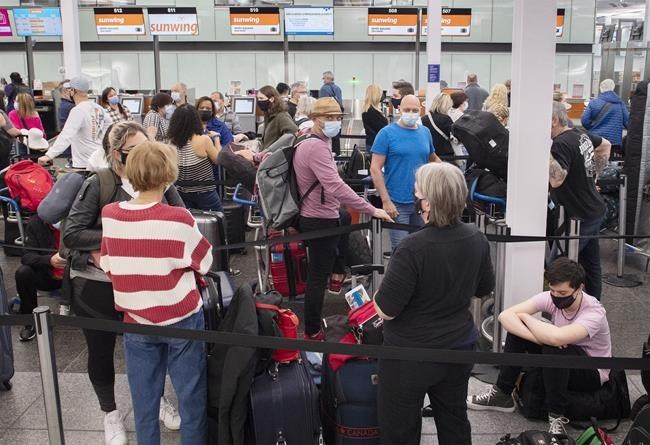Canadian airports and airlines logged a large number of flight delays last month, raising questions about their readiness for the summer travel rush.
Big airports and carriers had a much weaker on-time record in March than comparable U.S. outfits — and their own performance in 2019 — according to figures from aviation data firm OAG.
Toronto's Pearson airport saw 61.2 per cent of flights leave on time — within 15 minutes of their scheduled departure — versus 73 per cent four years earlier. By comparison, New York's JFK airport and Chicago's O'Hare airport had on-time performances of about 73 per cent and 79 per cent, respectively — within a couple percentage points of O'Hare's 2019 rate, indicative of American airports' quicker earlier recovery.
Air Canada's on-time arrival rate was 57.3 per cent in March versus 69.6 per cent in March 2019, before the COVID-19 pandemic upended the air travel industry. The latest number also contrasts to the 77-to-79 per cent range for three of the biggest U.S. carriers, though they generally face smoother weather conditions.
WestJet and Porter Airlines managed to land about 63 per cent and 65 per cent of their flights on time in March, respectively, compared with 80 per cent and 82 per cent four years earlier.
The higher volume of flight delays could bode poorly for travellers in the coming months and comes after chaotic travel seasons during the summer and winter holidays. The situation reflects systemic issues across the Canadian aviation sector, said former Air Canada chief operating officer Duncan Dee
"What is shocking to me from these numbers is that all three major national Canadian airlines face very similar on-time performance challenges," Dee said.
"The only conclusion is either Canadian airlines are operationally challenged or that operating in Canada involves common structural issues which all three Canadian carriers face, which makes their on-time performance markedly poorer versus their U.S. peers," he said.
Severe staffing shortages and high worker attrition rates were among the factors conspiring to snarl air travel as the sector began recovering from COVID-19-related travel restrictions in 2022. A lack of employees continues to plague positions including ground handlers, air navigators and pilots.
Airlines and the two federal agencies responsible for airport security screeners and border officers have told The Canadian Press they are adequately staffed to handle the flood of spring travellers.
The March performance data was not an exception. The percentage of on-time departures in Vancouver, Toronto and Montreal in February was well below that of airports in Seattle, Chicago, New York City and Boston, according to statistics from OAG.
And last month, the Montreal airport notched an on-time rate of about 68 per cent versus 80 per cent in March 2019. Calgary, the country's fourth-biggest airport, registered a rate of 72 per cent compared to 82 per cent four years before.
Meanwhile, the Minneapolis-Saint Paul airport, which is no stranger to rough weather and handles more passengers annually than both of those airports combined, saw 81 per cent of its flights depart on-time last month, just three percentage points below 2019.
Some experts say the wide variance between airlines' performance in Canada reveals that the problem can be traced largely to individual carriers, rather than reflecting an industry-wide ailment.
Sunwing Airlines and WestJet discount subsidiary Swoop landed fewer than half of their planes on time — 44 per cent and 49 per cent, respectively — down from about 57 per cent for both in March 2019. Sunwing's stats fall 21 percentage points short of WestJet's (distinct from Swoop).
"On-time performance and customer service has really taken a back seat to growing the size of the airline … and putting a schedule out there that’s very aggressive," said John Gradek, who teaches aviation management at McGill University, referring to Air Canada. He noted that its annual report contains "not a speck of information" about on-time travel.
"That doesn't bode very well for the summer," he said.
Gradek also pointed to pressure on U.S. airlines from Secretary of Transportation Pete Buttigieg and the Federal Aviation Administration, both of which have called on carriers to trim their schedules to avoid mass delays and cancellations.
"If the airlines don't do it, he'll do it. So United Airlines, American Airlines, everybody has been cutting back tens of thousands of flights — not thousands, tens of thousands — for the summer to basically reflect the fact that the system isn't ready. No such move in Canada," Gradek said.
"Everybody's crossing their fingers and holding their breath."
Air Canada spokesman Peter Fitzpatrick said the company is making a "concerted effort" to reduce delays.
He also highlighted funding differences between the U.S. and Canada.
"The U.S. government has announced US$40 billion in investments over the last few years in airport operating and infrastructure support, while the Canadian government continues to extract hundreds of millions in rent from Canadian airports. The industry has made the point repeatedly that to improve the travel experience for people, the government should be investing in all aspects of the air transport system," he said in an email.
Porter spokesman Brad Cicero said the Toronto-based airline now has a special working group that oversees performance.
"We expect this to be a short-term situation, partly related to introducing our new aircraft type, the E195-E2, into service as of February," he said of on-time performance.
Eric Forest, a spokesman for Aéroports de Montréal, said delayed departures stem from factors ranging from late arrivals to groundcrew availability, weather, security checkpoints and air traffic control — all areas outside airport authorities' control.
Airlines are ultimately responsible for flight schedules — and any failure to live up to them — he said.
This report by The Canadian Press was first published April 25, 2023.
Companies in this story: (TSX:AC)
Christopher Reynolds, The Canadian Press





